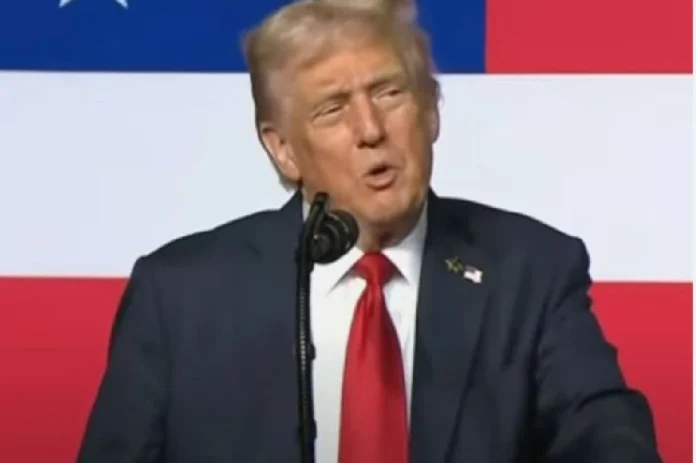By Kenneth Tiven
More authoritarian governance in North America and around the globe is the central goal of a second Trump administration. It rests on the belief that democracy is outdated, disregarding the American experiment of nearly 250 years in which three co-equal branches of government balanced the whims of kings and strongmen.
In a second term, Trump casts himself as the leading actor in redirecting America on everything from climate change to free speech. His ambitions became unmistakably clear during a live-streamed address to the nation in which the entire top leadership of America’s military—about 800 admirals, generals, and senior enlisted aides—were summoned on just four days’ notice. The cost: an estimated $25 million.
Trump’s message was blunt: “Don’t disagree with me.” He reminded his audience that loyalty was to him, not the Constitution, even though every officer swears otherwise. “If you don’t like what I’m saying, you can leave the room. Of course, there goes your rank, there goes your future, but you just feel nice and loose, ok?” he quipped. Not surprisingly, no one applauded; the military frowns on partisan politics.
This gathering followed Trump’s unprecedented orders sending the US military into American cities as de facto police. Framed as support for undertrained immigration officers rounding up undocumented residents, it bypassed due process. A Republican-dominated Supreme Court has been largely compliant, sanctioning moves once prohibited by law.
Trump’s Defence Secretary, Pete Hegseth—a former National Guard enlisted man and Fox News host—accused the armed forces of being weakened by “woke decay”. He promised sweeping reforms to purge political correctness, already firing dozens of women and men of colour from senior roles. His speech carried unmistakable tones of sexism and racism.
For Trump, the earlier obsession with rounding up immigrants now looks like a pretext: a way to position regular troops in US cities, blurring the line between military and police. His disdain for dissent—once obvious in his business career—has now become policy. Protesters and political opponents are recast as “enemies”, to be suppressed by force.
This authoritarian posture dovetails with Trump’s admiration for Russian President Vladimir Putin. His inner circle sees America less as a democracy with global responsibilities than as a theocracy insulated from international concerns. In this worldview, the US no longer plays the stabilizing role it once did after World War II and during the Cold War, when it fostered democracy abroad—sometimes imperfectly, but with lasting results, as seen in India’s independence and prosperity.
Traditionally, the American military has remained non-partisan, deployed abroad while states relied on National Guard units for domestic emergencies. Officers have avoided politics while in uniform, though some—like General Dwight Eisenhower—later became elected leaders. Trump himself never served, having secured deferments for college and bone spurs.
Many Americans saw the outlines of authoritarianism in Project 2025, a conservative policy blueprint circulated during Trump’s campaign. Few recognized how seriously it should be taken. Russell Vought, a 50-year-old conservative strategist, is its principal architect. His “America First” vision calls for collapsing the federal bureaucracy, tightening immigration, and promoting a narrow set of religious and cultural values.
If Vought provides the intellectual framework, Stephen Miller, Trump’s acid-tongued deputy, serves as his daily enforcer. Together, they channel Trump’s instincts towards building a government that is divisive, abusive, and unapologetically ethno-nationalist.
The current budget impasse underscores this clash. Trump and Republicans want control over how federal money is spent, traditionally the prerogative of Congress. So far, the Supreme Court has allowed his manoeuvres, while Democrats resist efforts to upend constitutional roles.
Not content with financial battles, Trump has gone further, issuing a memorandum to “crack down on perpetrators of assaults against democratic institutions, constitutional rights, and fundamental civil liberties”. Ironically, it describes not the opposition, but his own administration’s behaviour. For Trump, the enemies are anyone left of mid-20th-century conservatives like Joseph McCarthy or William F Buckley.
—The writer has worked in senior positions at The Washington Post, NBC, ABC and CNN and also consults for several Indian channels


